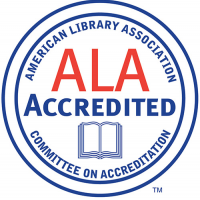- M.S. in Library and Information Science*
- School Information Specialist Endorsement for Licensed Teachers (non-degree)
- Archives and Records Management Post-Baccalaureate Certificate (non-degree)
Information Studies at Chicago State University
 Information Studies at Chicago State University focuses on the interrelationships among people, information, and technology. Our
programs emphasize the creation, organization, representation, access, dissemination,
preservation, and management of information and the use of information technologies
that enable effective communication and utilization. Program participants learn how
to leverage information and technology to improve the performance and productivity
of individuals, groups, organizations, and society. Our programs address the ethical,
political, social, cultural, and economic aspects of information access and use. We
embrace scientific, technological, and humanistic approaches to inquiry.
Information Studies at Chicago State University focuses on the interrelationships among people, information, and technology. Our
programs emphasize the creation, organization, representation, access, dissemination,
preservation, and management of information and the use of information technologies
that enable effective communication and utilization. Program participants learn how
to leverage information and technology to improve the performance and productivity
of individuals, groups, organizations, and society. Our programs address the ethical,
political, social, cultural, and economic aspects of information access and use. We
embrace scientific, technological, and humanistic approaches to inquiry.
We provide a variety of programs in Information Studies with an emphasis on library and information science, applied information technology, archives and records management, media, telecommunications management, computer networking and human performance technology. Our graduates apply the knowledge and skills gained from their programs in a variety of settings including libraries, schools and educational institutions, businesses, archives, and non-profit organizations.
Our Objectives Include:
- Recruit and retain a diverse student body by maintaining a flexible and supportive learning environment.
- Graduate information professionals who demonstrate leadership, especially in urban and multicultural communities.
- Advance and contribute to information studies fields through research, consulting, and continuing education efforts of students, graduates, and faculty.
Information Studies Programs
We offer two master’s degree programs and a number of certificates and endorsements. The programs and certificates in information studies include:
- M.S. in Technology and Performance Improvement Studies
- Telecommunications Management Post-Baccalaureate Certificate (non-degree)
- Information Technology Undergraduate Minor/Certificate
- Education Technology Specialist Post-Baccalaureate Certificate for Licensed Teachers (non-degree)
- Minor concentration in Security and Intelligence Studies
- Post-Baccalaureate Certificate in Security and Intelligence Studies
*The Master of Science in Library and Information Science program at Chicago State University is accredited by the American Library Association Committee on Accreditation, with the status of initial accreditation. The next comprehensive review visit is scheduled for Spring 2027.
Distance Learning
We have received approval from the Higher Learning Commission (HLC) to offer our master’s degree programs in the online delivery format. The M.S. in Library and Information Science program and the M.S. in Technology and Performance Improvement Studies program are both online programs. At CSU, an “online” program offers more than 50% of its courses in the web or hybrid delivery format.
A “web-based” or "online" course has been defined the following way: “Course is conducted entirely over the web through the use of a course management system. Instructors and students are required to actively use the course management system in order to complete the various components of the course." These courses can be in the following modalities:
(a) Asynchronous – where students are not required to be available at a specific time on a regular basis or
(b) Synchronous – the classes meet through various software at regularly scheduled times; however the student does not come to campus.
A “hybrid” (blended) course has been defined in the following way: “Course materials include a significant amount of electronic materials/activities provided online through the course management system. Class sessions include a limited number of scheduled sessions on campus, as well as a significant number of sessions comprised of online activities and interaction with no requirement to physically be on campus. Students are required to actively use the course management system in order to complete the various components of the course." Contract pp. 191-192.
The course management system used at CSU is Moodle.
Distance Learning Statement
The courses within the information studies’ degree programs and certificates are primarily offered as online, Internet-based courses. This format allows students to complete their coursework from anywhere, at any time, as long as they have access to the Internet. However, while flexibility for students to schedule their study time, assignments and activities have specified due dates and expectations. In addition, some faculty may offer opportunities for students to be online at specific times to interact as a class.
Online courses are not easier than traditional, face-to-face courses. Some students find online courses require more time and effort, as far more reading and writing is typically required. Therefore, these courses are geared towards graduate students, who can take responsibility for their own learning, who are comfortable using necessary technologies, and able to communicate effectively through writing. To be successful, it is expected students will log into the course frequently (at least two to three times per week) and be active in their participation.
Learn More
Learn more about Chicago State University by checking out this virtual tour, or visiting the websites of the Gwendolyn Brooks Library, Archives and Special Collections, and/or Student Affairs.


 All Rights Reserved
All Rights Reserved